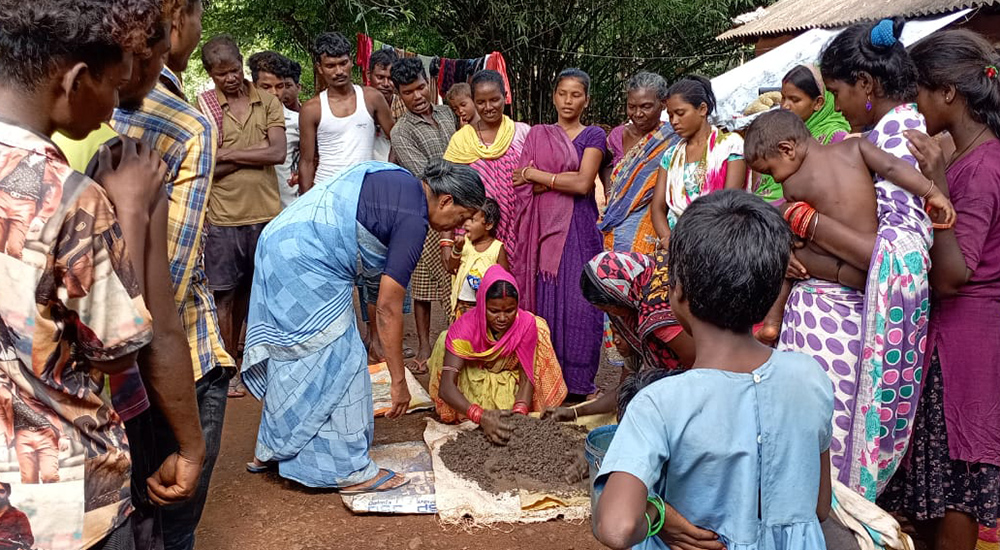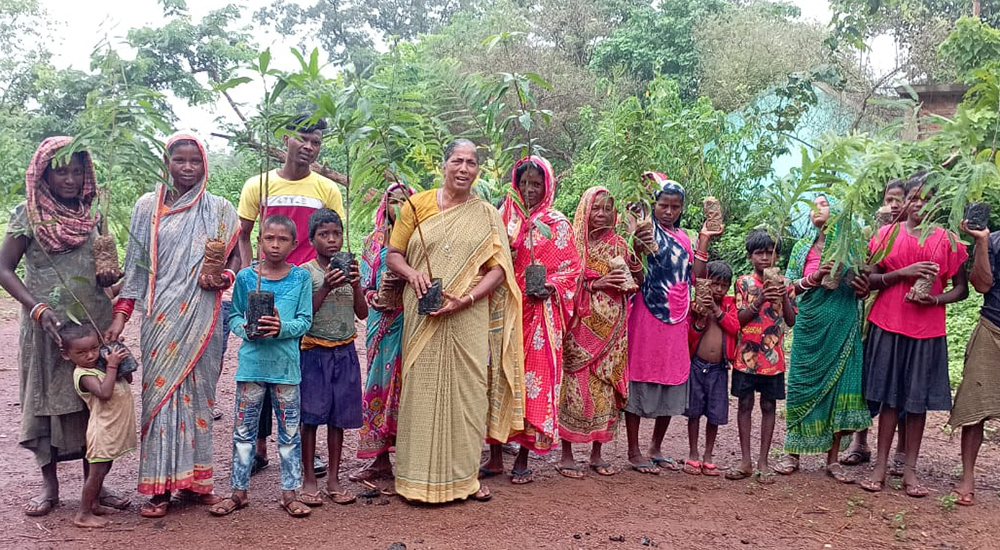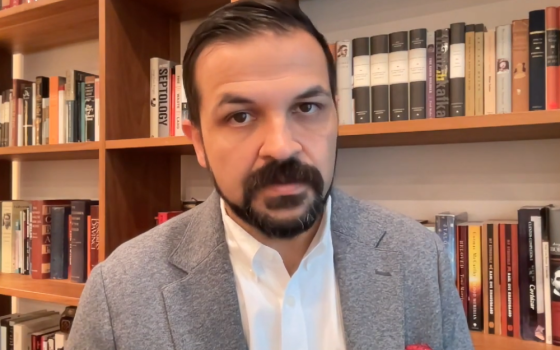
Sister Lisha demonstrates the method of organic manure composition to villagers. Sister Lisha, of the Missionary Sisters Servants of the Holy Spirit, pioneers in many rural mission initiatives among economically disadvantaged tribes of Odisha state, in India. (Courtesy of Tessy Jacob)
My elder brother is a religious priest. As a seminarian, whenever he came home for vacation, my grandfather would tell him proudly, "I have sent you as the laborer in God's vineyard," and my brother would retort wittily, "God doesn't have a vineyard. He changed the crop into a rubber plantation." As rubber was a leading cash crop in Kerala, my brother replaced the vine grove with better income-earning cultivation. Back then, as a little girl, I took the comment for its literal meaning, and I believed that all those who become a priest or sister work in a vast field, cultivating souls! Priests and sisters working as peasants were beyond my grasp.
However, when I entered this "vineyard" years later, farming was part of sustainability and eco-spirituality. I didn't see any sister rigorously going about sowing and harvesting except for supervising those activities on our farm. Until the 1990s, the traditional mission activities of education, health care, and socio-pastoral activities continued with newer initiatives and better reach. As the years went by, newer mission fields were opened, such as migration ministry, media communication, social ministry, youth mission, etc.
Although environmental concern was a periphery mission, in the early 2000s, climate changes were yet to grip our consciousness, especially for my province, which is mainly spread across Odisha, a tribal populated state in India where seasons remained relatively steady with extreme weather conditions. That was not a grave concern for us as there were many other human conditions that were to be given priority. However, activities were conducted to empower women in rural areas with the farming lifestyle with which they were familiar. Today kitchen gardens and small-scale production of biofertilizers are practiced by many households. Usually, the production remains for domestic purposes.
"Laudato Si', on Care for Our Common Home," published on May 24, 2015, as the second encyclical of Pope Francis, was a wake-up call for all of us to make concrete action plans for saving mother earth. By then, global warming had reached our doorsteps too; summers were unbearable and long; farming and cultivation were not yielding sufficiently for living. People were abandoning farming due to adverse climate conditions and failed crops. This condition induced mass migration from rural areas to urban areas. From the perspective of tribal migration from Odisha, it was a huge risk for the lives of the young men and women, as they were semi-illiterate or illiterate and vulnerable to exploitation. The new challenge forced us to face this new anomaly. While on one side migration ministry advocated for the safety of migrants in new lands, other social activists looked for ways to curb mass migration and retain the traditional village activities. Villages were also losing their youth population, posing a challenge for the agricultural industry and products.
Advertisement
Sister Lisha of the Missionary Sisters Servants of the Holy Spirit, who pioneers in many rural mission initiatives among the economically disadvantaged tribes of Odisha, took up the new challenge with highly productive and eco-friendly countermeasures. Sister Lisha, a professional nurse with exceptionally healing hands, had already won the hearts of the village folks she tends to. There were government initiatives towards strengthening the agriculture sector in rural areas. However, the drive was not reaching every section of society sufficiently. Sister Lisha, along with many other like-minded individuals, took the initiative to learn from the sources and spread the knowledge to the masses in the villages.
She would travel with selected farmers from place to place, learning and experimenting with new farming methods. Vermicomposting, organic farming, organic fertilizers, pesticides, and hormones were a great success, as they yielded healthy and massive crops. The people developed the best nutrition for plants out of fish waste. Organic farming tactics were cost-effective, but they required patience and commitment. Many times, Sister Lisha could be seen seated in fields, surrounded by village folks, either making manure for the farm, or cultivating, or even beaming with happiness beside the healthy crops. My childhood fantasy took over my imagination: even sisters can be laborers in God-given farmland!
If one wants to be a shepherd, she should have the smell of the sheep. The same goes for farming too: if you want to be a farmer-influencer, you should have the smell of mud. Nature does not differentiate human beings based on caste, creed or culture. Nature provides for all who toil in it. If our Catholic mission is to save souls for heaven, Sister Lisha breaches the parameter of saving "Christians" and is saving souls of all those who care for the earth.

Sister Lisha posing with the villagers she serves and whose tribal dialect she has mastered in order to communicate with them (Courtesy of Tessy Jacob)
This is a unique mission. It is not an institutionally bound setup nor an income-producing activity. Sister Lisha, and many more sisters who have taken up this mission activity fully by now, spend their days with men and women who toil in fields despite the weather condition. I had a few chances to accompany Sister Lisha to the villages and felt that it is a very humbling and down-to-earth approach to create fellowship, sustainability, and dignity of life and labor. It is significant that many more sisters across congregations have taken up this new initiative and are actively promoting organic farming, which in turn provides a better life for the poor village folks. Perhaps this is the meaning of missionary — go to people and do what they do and preach with your actions the kingdom values, rather than bringing people to our structures and showing them kingdom values.
The new initiative has not lessened emigration. Cities offer fast money and better living. It will take ages to recapture the lost art of framing. However, these sisters, along with nongovernmental organizations, government sectors, and like-minded people come forward to encourage farming activities in the village. One of the villages conducts an annual "Seed fair," promoting organic farming over genetically modified seedlings. Likewise, various agricultural promotional exhibitions are conducted to provide scientific and technical assistance to farmers.
The backbone of India is its farmers. What greater mission and evangelization can sisters have other than strengthening and supporting the backbone of society? It is essential to promote and support the agricultural sector for a sustainable future, even amid traditional missionary activities in this fast-changing ecosystem.






